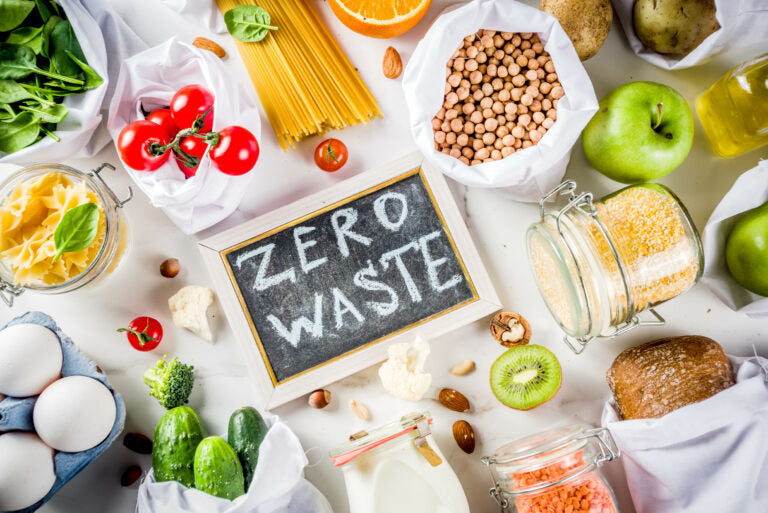Healthy zero-waste cooking – how do you use all the ingredients?
- Why is so much food thrown away?
- Plan your meals with a shopping list
- How do I shop sensibly and without waste?
- Is it worth buying in stock?
- Leftovers don’t belong in the trash – they can be used creatively
- It's worth sharing food we don't have time for
Zero waste is a growing trend that focuses on maximizing the use of available food products and minimizing waste. With a little ingenuity, such as proper meal planning and efficient use of leftovers, we can not only reduce our negative impact on the environment but also save money. By adopting a few simple habits in our daily cooking, we can become more responsible for both our finances and the future of the planet. It's worth learning a few tried-and-tested methods that will help implement the zero-waste principle in the kitchen and allow you to create delicious meals from leftovers while maintaining balanced meal planning.
Why is so much food thrown away?
Food waste is caused by many factors. One of the main factors is consumer misunderstanding of product packaging labels. According to the Commission's "Consumer Empowerment in the EU" report, up to 18% of EU citizens have difficulty interpreting the phrase "best before" (best before date). This highlights the need to clarify these terms to prevent unnecessary food waste. It should be noted that products bearing this label can be harmful if consumed even after the expiration date, even if properly stored.
Products with a "use by" date, on the other hand, require prompt consumption before the date indicated. Only these items may be at risk of food quality or safety deterioration when the date expires. Learning the difference between these two markings can help you better manage your supplies and reduce the amount of food you throw away.
Plan your meals with a shopping list
Reducing food waste starts with conscious meal planning. By creating a weekly menu, you can determine exactly which products you need, preventing unnecessary purchases and stockpiling. The key to success is creating a shopping list, which not only avoids impulsive spending but also effectively reduces food waste.
How do I shop sensibly and without waste?
To effectively reduce food waste, it's worth starting with a conscious approach to shopping. The key aspect is to choose products that are not only diverse but also go well together. This way, instead of eating the same foods several days in a row, you can prepare a variety of delicious meals. Try to buy raw ingredients that can be easily combined to create healthy, nutritious meals. While convenient, convenience foods are often more expensive and less healthy, and their production creates more waste. Preparing food with natural ingredients is better for both your health and the environment.
Another good solution is to buy products by weight, especially those that can be stored in reusable containers such as glass jars or cotton bags. This allows you to buy exactly the amount you need, avoiding the risk of excess food ending up in the trash. This type of shopping also limits the use of single-use packaging, which has a positive impact on reducing waste.
The next step in waste prevention is to differentiate between the two dates on product packaging discussed above: the date that determines the best quality of the product and the use-by date. The first term (e.g., "best before date") applies to products that retain their full quality until the date indicated, but may lose their taste, smell, or appearance after that date. Products such as flour , pasta, and cereals can be consumed after this date provided they have been stored properly. Perishable products such as yogurt or cheese, on the other hand, have a best-before date (e.g., "use by"). They should not be eaten after this date due to the risk of bacteria and other microorganisms multiplying.
Also, remember to choose local products. Food imported from distant parts of the world not only entails longer transport times but also a higher risk of spoilage during transit, leading to greater waste production. In addition, transporting food long distances contributes to pollution and increases our carbon footprint. By shopping locally, we reduce both the amount of food wasted and the negative impact of transport on our planet. By making sure to minimize the so-called "food miles", the distance that food travels from the place of production to the table, we support sustainable development and reduce unnecessary losses.
Is it worth buying in stock?
Pre-purchasing loose produce can be beneficial, but it's important to exercise moderation to avoid the development of pests such as pantry moths. Products like flour, sugar, and grits should be purchased in larger quantities, but with caution. Stock up on these items once a month or every two weeks, depending on your needs. Fresh produce like vegetables, fruit, and dairy products are best purchased in smaller portions—just enough to consume within a few days. This will help you avoid wasting them.
When it comes to fresh produce, you should plan your shopping carefully. Prolonged storage at home leads to mold growth, and in this condition, the food becomes dangerous. Please note that simply removing the moldy part is not enough. Any food showing signs of spoilage should be thrown away. By properly organizing your shopping, you minimize the risk of food waste and gain more confidence that you're consuming wholesome, nutrient-rich, and fresh produce.
Leftovers don’t belong in the trash – they can be used creatively
Instead of throwing away leftovers, it's worth using them in diverse and creative ways in the kitchen. For example, instead of discarding vegetable leaves like radish leaves, try adding them to a salad or making pesto . You can easily make a delicious creamy soup from small portions of groats, pulses, or vegetables you've got in the fridge. Individual vegetables, meanwhile, are perfect for pancakes. We encourage you to experiment with zero-waste recipes—use them for inspiration to make positive changes in any kitchen.
It's worth sharing food we don't have time for
Food that's about to expire should be shared. Don't throw it away. There are many ways to share food that can reach people in need. Food banks and soup kitchens are places where you can donate surplus produce, which will be given to those in need. Many cities, including Warsaw and Łódź, have community refrigerators where you can store food with a shorter expiration date. They're available near shops and offices, among other places. Social organizations like the Our Bread association in Łódź are also building a network of refrigerators to facilitate access to donated food. Food can also be donated to humanitarian organizations, such as the Warsaw Expo, which provide information about current needs.
The modern pace of life and rising food prices due to inflation mean that many of us are looking for quick and affordable meal solutions. Ready-to-go meals are very popular, but is it possible to combine convenience with financial benefits and at the same time do something good for others? It turns out that yes. In Poland, as in other European countries, there are apps that allow you to buy food from restaurants at a cheaper price and at the same time help in the fight against food waste. The "Too Good To Go" app is very popular because it allows users to buy surplus food from restaurants at a reduced price. Another tool is "Foodsi", which cooperates with local businesses to promote responsible food management. In Warsaw, there is the "Foodsharing Warszawa" initiative, which aims to facilitate food sharing and inform residents about available dining options in the city.
These innovative solutions not only enable savings but also support people who can benefit from the donated food, thus contributing to waste reduction.
THE PUBLISHER'S CHOICE
Dried plums 1 kg BIOGO
- €7,01
- €7,01
- Unit price
- / per
Dried White Mulberries 500 g ORGANIC
- €5,84
- €5,84
- Unit price
- / per
Almonds 1 kg BIOGO
- €11,69
- €11,69
- Unit price
- / per
Cranberries sweetened with apple juice organic 1 kg BIOGO
- €16,37
- €16,37
- Unit price
- / per
Dried dates 1 kg BIOGO
- €4,21
- €4,21
- Unit price
- / per
Unpeeled buckwheat groats 1 kg BIOGO
- €2,81
- €2,81
- Unit price
- / per
Walnuts 800 g BIOGO
- €8,65
- €8,65
- Unit price
- / per
Peeled sunflower seeds 1 kg BIOGO
- €3,04
- €3,04
- Unit price
- / per
PULLED ORGANIC SUNFLOWER SEEDS 1 KG BIOGO
- €4,44
- €4,44
- Unit price
- / per












































































































































